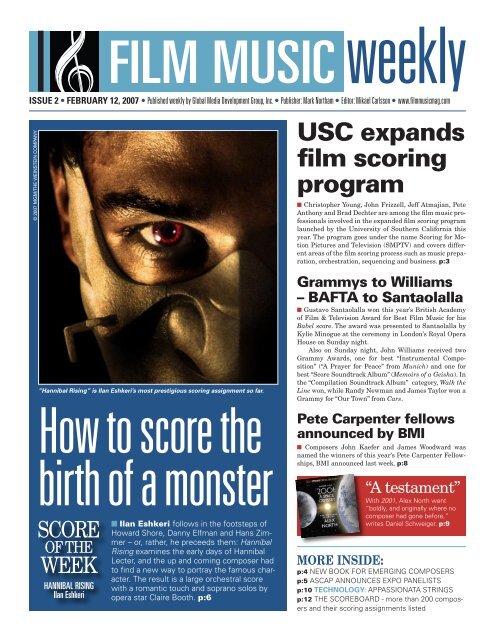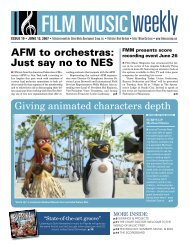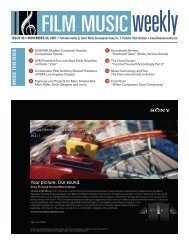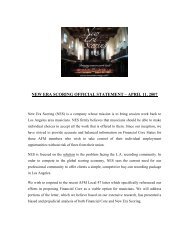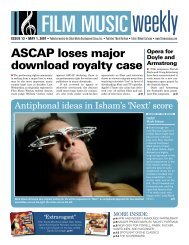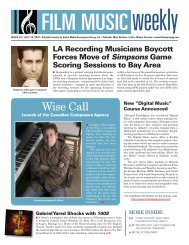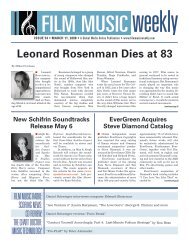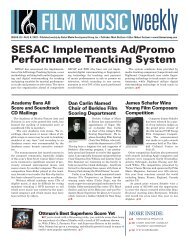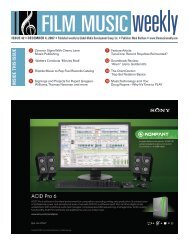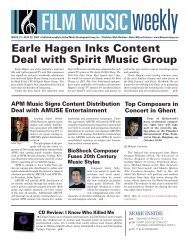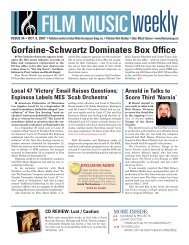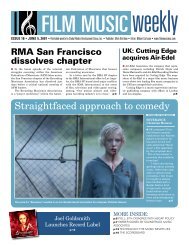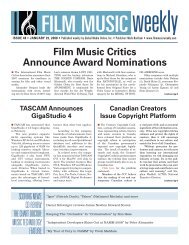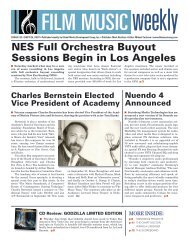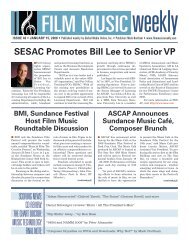February 12, 2007 - Film Music Magazine
February 12, 2007 - Film Music Magazine
February 12, 2007 - Film Music Magazine
Create successful ePaper yourself
Turn your PDF publications into a flip-book with our unique Google optimized e-Paper software.
FILM MUSIC weekly<br />
ISSUE 2 • FEBRUARY <strong>12</strong>, <strong>2007</strong> • Published weekly by Global Media Development Group, Inc. • Publisher: Mark Northam • Editor: Mikael Carlsson • www.filmmusicmag.com<br />
© <strong>2007</strong> MGM/THE WEINSTEIN COMPANY<br />
“Hannibal Rising” is Ilan Eshkeri’s most prestigious scoring assignment so far.<br />
How to score the<br />
birth of a monster<br />
SCORE<br />
OF THE<br />
WEEK<br />
HANNIBAL RISING<br />
Ilan Eshkeri<br />
n Ilan Eshkeri follows in the footsteps of<br />
Howard Shore, Danny Elfman and Hans Zimmer<br />
– or, rather, he preceeds them: Hannibal<br />
Rising examines the early days of Hannibal<br />
Lecter, and the up and coming composer had<br />
to find a new way to portray the famous character.<br />
The result is a large orchestral score<br />
with a romantic touch and soprano solos by<br />
opera star Claire Booth. p:6<br />
USC expands<br />
film scoring<br />
program<br />
n Christopher Young, John Frizzell, Jeff Atmajian, Pete<br />
Anthony and Brad Dechter are among the film music professionals<br />
involved in the expanded film scoring program<br />
launched by the University of Southern California this<br />
year. The program goes under the name Scoring for Motion<br />
Pictures and Television (SMPTV) and covers different<br />
areas of the film scoring process such as music preparation,<br />
orchestration, sequencing and business. p:3<br />
Grammys to Williams<br />
– BAFTA to Santaolalla<br />
n Gustavo Santaolalla won this year’s British Academy<br />
of <strong>Film</strong> & Television Award for Best <strong>Film</strong> <strong>Music</strong> for his<br />
Babel score. The award was presented to Santaolalla by<br />
Kylie Minogue at the ceremony in London’s Royal Opera<br />
House on Sunday night.<br />
Also on Sunday night, John Williams received two<br />
Grammy Awards, one for best “Instrumental Composition”<br />
(“A Prayer for Peace” from Munich) and one for<br />
best “Score Soundtrack Album” (Memoirs of a Geisha). In<br />
the “Compilation Soundtrack Album” category, Walk the<br />
Line won, while Randy Newman and James Taylor won a<br />
Grammy for “Our Town” from Cars.<br />
Pete Carpenter fellows<br />
announced by BMI<br />
n Composers John Kaefer and James Woodward was<br />
named the winners of this year’s Pete Carpenter Fellowships,<br />
BMI announced last week. p:8<br />
“A testament”<br />
With 2001, Alex North went<br />
“boldly, and originally where no<br />
composer had gone before,”<br />
writes Daniel Schweiger. p:9<br />
MORE INSIDE:<br />
p:4 NEW BOOK FOR EMERGING COMPOSERS<br />
p:5 ASCAP ANNOUNCES EXPO PANELISTS<br />
p:10 TECHNOLOGY: APPASSIONATA STRINGS<br />
p:<strong>12</strong> THE SCOREBOARD - more than 200 composers<br />
and their scoring assignments listed
FILM MUSIC<br />
weekly<br />
Publisher: Mark Northam<br />
Editor: Mikael Carlsson<br />
VP Finance and Operations: Rebecca Lee<br />
Art Director: Mikael Carlsson<br />
Advertising Sales Manager:<br />
Steve Schatzberg<br />
Technology Editor: Peter Alexander<br />
Soundtrack Review Editor:<br />
Daniel Schweiger.<br />
Website Design: Rakesh Rai<br />
Accounting: Tina Chiang<br />
Legal Advisor: Patricia Johnson, Esq.<br />
<strong>Film</strong> <strong>Music</strong> Weekly is published weekly by Global<br />
Media Development Group, Inc.<br />
Executive and Editorial Office: 27023 McBean Parkway<br />
Suite 618, Valencia, CA 91355. Tel: 310-645-<br />
9000 Fax: 310-388-1367,<br />
email: info@filmmusicweekly.com.<br />
We are not responsible for unsolicited material.<br />
All Rights Reserved. Reproduction in whole or in<br />
part without written permission of the publisher is<br />
prohibited. The opinions of contributing writers and<br />
editors to this publication do not necessarily reflect<br />
the views of Global Media Development Group, Inc.<br />
or any of our divisions, management or staff.<br />
YOUR FEEDBACK<br />
We welcome feedback on any aspect of <strong>Film</strong> <strong>Music</strong><br />
Weekly. All letters must include an address and<br />
daytime phone number. We reserve the right to<br />
edit letters for clarity and space and to use them in<br />
all electronic and print editions. Mail to: <strong>Film</strong> <strong>Music</strong><br />
Weekly, 27023 McBean Parkway Suite 618, Valencia,<br />
CA 91355 or email<br />
feedback@filmmusicweekly.com<br />
ADVERTISING<br />
Our comprehensive advertising programs offer<br />
premier visibility to film and television music professionals,<br />
soundtrack collectors, and music executives<br />
worldwide. We offer competitive rates on a<br />
wide variety of advertising opportunities including<br />
display advertising and online advertising. For more<br />
information, call 1-800-774-3700 or 310-645-9000 or<br />
email sales@filmmusicweekly.com<br />
REPRINTS AND COPYRIGHT PERMISSIONS<br />
Before quoting or reusing editorial material, or for<br />
custom reprints (minimum order 100) contact 310-<br />
645-9000 or email reprints@filmmusicweekly.com<br />
SUBSCRIPTIONS<br />
Subscriptions to <strong>Film</strong> <strong>Music</strong> Weekly via email are<br />
available at no cost. To subscribe, visit our website<br />
at www.filmmusicweekly.com and enter your email<br />
address in our subscription section.<br />
<strong>Film</strong> <strong>Music</strong> Weekly and its logo are trademarks of<br />
Global Media Development Group, Inc. All Rights<br />
Reserved. Entire Contents © <strong>2007</strong> Global Media<br />
Development Group, Inc<br />
This Week on<br />
FMR<br />
FILM MUSIC RADIO<br />
ON THE SCORE:<br />
AARON ZIGMAN<br />
<strong>Film</strong> music journalist Daniel<br />
Schweiger interviews Aaron<br />
Zigman, whose music leads<br />
us over the Bridge To Terabithia.<br />
Also hear interviews with<br />
Johnny Klimek and Reinhold<br />
Heil, Alexandre Desplat, Hans<br />
Zimmer and Thomas<br />
Newman.<br />
INSIDE THE BUSINESS:<br />
DOUG WOOD<br />
Join host Mark Northam for<br />
an candid, in-depth interview<br />
with composer and music<br />
library owner Doug Wood<br />
about his ASCAP Board<br />
candidacy and more. Also hear<br />
interviews with Dan Kimpel,<br />
John Braheny and Samm<br />
Brown III.<br />
TUNE IN HERE!<br />
2 ISSUE 2 • FEBRUARY <strong>12</strong>, <strong>2007</strong> FILM MUSIC weekly
FILM MUSIC NEWS<br />
USC expands their<br />
film scoring program<br />
The University of Southern<br />
California expands its film<br />
scoring program. Among the<br />
teachers involved are Christopher<br />
Young, Richard Kraft,<br />
Pete Anthony, Jeff Atmajian<br />
and John Frizzell.<br />
In Los Angeles one of the nation’s<br />
top film scoring schools has been<br />
making some great leaps in terms<br />
of curriculum, faculty and production<br />
facilities. USC has recently<br />
expanded the format and faculty<br />
of its one-year film scoring course<br />
program to include course instruction<br />
offered by working professionals<br />
presented in modules.<br />
The new program, also known<br />
as Scoring for Motion Pictures and<br />
Television (SMPTV) incorporates<br />
a modular program that breaks<br />
the traditional 15 week semester<br />
into two sections of 7 and 8 weeks<br />
or three 5-week sections.<br />
“In this way, we can have<br />
Steve Juliani cover music preparation<br />
in Finale and Sibelius for<br />
five weeks, Pete Anthony, Jeff Atmajian<br />
and Brad Dechter for five<br />
weeks of orchestration and J. Eric<br />
Schmidt for five weeks of classes<br />
in animation writing and another<br />
five weeks focused on conducting,”<br />
said SMPTV program director<br />
Brian King.<br />
Veteran composer Christopher<br />
Young shares a fifteen-week<br />
course with agent Richard Kraft<br />
in which they alternate weeks,<br />
providing the instructors with<br />
some flexibility in their teaching<br />
schedules. King explains that<br />
SIGNINGS & PROJECTS<br />
Terence Blanchard:<br />
Talk To Me<br />
n Composer and<br />
trumpeter Terence<br />
Blanchard<br />
is doing the score<br />
for Talk To Me, a<br />
film about Washington<br />
D.C. radio<br />
personality Ralph “Petey” Greene,<br />
portrayed by Don Cheadle. The<br />
Christopher Young, Richard Kraft, Pete Anthony and John Frizzell.<br />
for students, studying with Chris<br />
Young as he scores Spiderman 3<br />
or visiting with Pete Anthony as<br />
he orchestrates and conducts for<br />
Teddy Shapiro’s score to the upcoming<br />
Will Ferrell movie Blades<br />
of Glory at Sony and having agent<br />
Richard Kraft educate students on<br />
how to break into the business are<br />
good examples of the benefits of<br />
this new format.<br />
The same philosophy applies<br />
to the SMPTV technology track<br />
which includes modules in music<br />
editing taught by Chris Brooks,<br />
Protools taught by Rick Schmunk,<br />
Logic Pro taught by John Frizzell<br />
and Freddie Wiedemann, and<br />
Digital Performer taught by Sean<br />
Dougall and Jeff Toyne. To facilitate<br />
this, the school has added a<br />
new classroom with 20 individual<br />
workstations plus a teaching station.<br />
Each station is equipped with<br />
all of the hardware and software<br />
needed for the students to learn<br />
and apply the latest technology in<br />
their work.<br />
Also new to SMPTV is their<br />
two-week intensive technology<br />
boot camp which begins in August,<br />
2 weeks before the start of regular<br />
classes. This gives the students<br />
a chance to work exclusively on<br />
film is directed by Kasi Lemmons,<br />
with whom Blanchard previously<br />
worked on The Caveman’s Valentine.<br />
Blanchard records his score<br />
for Talk To Me at Seattle’s Studio<br />
X.<br />
Ryan Shore: Numb<br />
n Numb, a drama comedy starring<br />
Matthew Perry and Mary<br />
Steenburgen, gets a score written<br />
technology with instructors for 6<br />
hours a day including intensive<br />
work with digital sequencing programs<br />
and sample libraries. By<br />
the end of the two weeks, each<br />
student scores a scene from Hidalgo<br />
in Digital Performer and<br />
Collateral.<br />
On the television side, composer<br />
Jon Ehrlich has joined the<br />
faculty and the program continues<br />
its third year of internships with<br />
composer Michael Giacchino for<br />
the Lost series where each student<br />
gets an opportunity to work on a<br />
different episode with Giacchino<br />
and his staff, experiencing the<br />
entire process from the spotting<br />
session to the final dub. They also<br />
have a chance to conduct an orchestra<br />
in a live setting for music<br />
that is used for broadcast.<br />
On the production side, partnered<br />
with the USC School for<br />
Cinematic Arts, SMPTV student<br />
composers have numerous opportunities<br />
to work with student filmmakers<br />
while producing the music<br />
for more than 80 films per year.<br />
mn<br />
READ MORE HERE<br />
www Info on the SMPTV program at<br />
USC Thornton School of <strong>Music</strong><br />
by Ryan Shore,<br />
who previously<br />
wrote the music<br />
for Prime, Headspace<br />
and Confession.<br />
Numb is directed<br />
by Harris<br />
Goldberg. Shore has also recently<br />
written the music for the upcoming<br />
thriller The Girl Next Door,<br />
produced by Headspace’s director<br />
Andrew van den Houten. mc<br />
FROM THE EDITOR<br />
Thanks for<br />
all the warm<br />
feedback!<br />
have had the idea to create<br />
I a weekly film music newsletter<br />
for many years. When I was<br />
approached by Mark Northam<br />
to become the soundtrack news<br />
editor of <strong>Film</strong> <strong>Music</strong> Radio<br />
one year ago, I already had<br />
thoughts about doing something<br />
that would attract both<br />
sides of the film music coin:<br />
the professionals and the fans.<br />
I was very happy when Mark<br />
agreed to start working on<br />
<strong>Film</strong> <strong>Music</strong> Weekly with me<br />
– and here we are! The first<br />
issue which came out last week<br />
has been met with a lot of enthusiasm<br />
from both composers,<br />
agents, label executives and<br />
soundtrack fans. Thank you all<br />
for your encouragement.<br />
The world of film music is a<br />
very special one, especially<br />
in terms of its fan base.<br />
The audience is extremely<br />
knowledgeable and has a true<br />
passion for film music – yet,<br />
they aren’t the main target<br />
audience. With their music,<br />
film composers have to communicate<br />
first and foremost with<br />
general cinema, TV and game<br />
audiences all over the world.<br />
Their music has to work techically<br />
and emotionally on every<br />
level, but they cannot write<br />
to satisfy their fans – that’s<br />
not even the second priority.<br />
That makes the relationship<br />
between film composers and<br />
their fans a very special, and<br />
complicated, one. Metallica or<br />
Helmut Lotti can do an album<br />
only to make their fans happy!<br />
With FMW, we hope to<br />
build a bridge between<br />
the industry and the fanbase.<br />
Just like film composers, we<br />
hope that we will be able to<br />
satisfy both!<br />
Mikael Carlsson<br />
Editor<br />
editor@filmmusicweekly.com<br />
FILM MUSIC weekly ISSUE 2 • FEBRUARY <strong>12</strong>, <strong>2007</strong> 3
FILM MUSIC NEWS<br />
JUST A<br />
MOMENT...<br />
... Scott Glasgow, whose<br />
first major soundtrack release<br />
comes out on Varèse<br />
Sarabande tomorrow.<br />
Robotech: The Shadow<br />
Chronicles is your first<br />
major CD release. Are you<br />
happy with the result?<br />
Yes, I am happy with how it<br />
all came together. It wasn’t easy<br />
and there were of course budget<br />
limitations during the project<br />
which presented many challenges<br />
on recording and mixing<br />
this score but it also made me<br />
try to find creative solutions<br />
to the problems. As for Varèse<br />
Sarabande, I feel tremendously<br />
honored that Robert Townson<br />
took on this project. What a<br />
dream come true.<br />
So... Who is Scott Glasgow?<br />
Oh, wow. Well, I guess, I am<br />
just another trooper out here<br />
struggling to be heard in this<br />
crowd of great composers working<br />
in film. It is not an easy<br />
career for anyone. I just hope<br />
to keep working and finding interesting<br />
projects to work on. So<br />
far, I have been lucky.<br />
Robotech is a majestic, large<br />
orchestral score. Is this the<br />
kind of music you enjoy to<br />
write the most?<br />
Yes! Indeed. I think the<br />
large orchestral score is really<br />
my favorite music to write for.<br />
On top of that, I think science<br />
fiction is my favorite film genre<br />
for film scoring so Robotech was<br />
a blessing. mc<br />
Emerging composers<br />
get advice by Bellis<br />
New book to bridge gap between academic studies and “real life”<br />
In his book “The Emerging<br />
<strong>Film</strong> Composer”, composer<br />
Richard Bellis focuses on<br />
bridging the gap between<br />
academic study and the reality<br />
of earning a living in the<br />
business.<br />
Richard Bellis, a<br />
veteran composer<br />
whose TV credits<br />
include It, One<br />
Special Night and<br />
To Grandmother’s<br />
House We Go, has<br />
been working on his new book for<br />
more than a year, but the information<br />
in it comes from 20 years of<br />
teaching.<br />
Bellis has trained aspiring<br />
film composers at USC’s Scoring<br />
for <strong>Film</strong> and Television, UCLA’s<br />
Extension <strong>Film</strong> Scoring Program<br />
and the ASCAP Television and<br />
<strong>Film</strong> Scoring workshop.<br />
“There are many books available<br />
for people interested in becoming<br />
film composers. Most, if<br />
not all, give what might be called<br />
the nuts and bolts of the craft. Using<br />
that analogy, what was missing<br />
was a book that talked about<br />
how to use a wrench. A source<br />
that bridges the gap between the<br />
academic study of film scoring<br />
and the reality of trying to make a<br />
living as a media composer,” says<br />
Richard Bellis.<br />
SIGNINGS & PROJECTS<br />
Marcus Miller: I Think<br />
I Love My Wife<br />
n Legendary<br />
bass player and<br />
composer Marcus<br />
Miller is doing<br />
the score for I<br />
Think I Love My<br />
Wife, a romantic<br />
comedy starring Kerry Washington<br />
and Chris Rock, who is also<br />
directing the film from his own<br />
screenplay. <strong>Film</strong> is slated to premiere<br />
on March 16.<br />
He says that he wants to “protect<br />
and maintain the value and<br />
stature of film music”.<br />
“The best way to do this is to<br />
instill in the emerging composer,<br />
who just wants to score a film<br />
more than anything else, a sense<br />
of responsibility for the well-being<br />
of our profession,” says Bellis.<br />
Aspiring film composers get<br />
all kinds of advise from industry<br />
veterans and teachers, but Bellis<br />
feels that no one talks about the<br />
most important aspect.<br />
“Is this the right profession for<br />
you? Can you afford to be a media<br />
composer? This is a particularly<br />
challenging time to attempt to<br />
break into this business,” he says.<br />
“You are often competing<br />
against people who have no regard<br />
for the value of music and will do<br />
it for free. That is, of course until<br />
they can’t afford to support themselves<br />
with free work and move on<br />
to some other occupation. Leaving<br />
behind film makers who now<br />
think that all film music is free.”<br />
The book deals with the “People,<br />
Problems and Psychology” of<br />
the film music business.<br />
“Today, with an abundance<br />
of emerging composers, relationships<br />
are more important than<br />
musical brilliance.”<br />
Surely, there are many talented<br />
but virtually unknown composer<br />
out there – people who never get<br />
David Mansfield:<br />
Then She Found Me<br />
n David Mansfield(Transamerica)<br />
has been<br />
hired to score<br />
Helen Hunt’s<br />
helming debut,<br />
The She Found<br />
Me, starring Hunt, Colin Firth,<br />
Bette Midler and Matthew Broderick.<br />
Mansfield is also doing the<br />
score for The Guitar, directed by<br />
Amy Redford (Robert’s daughter).<br />
The emerging<br />
<strong>Film</strong> composer<br />
An introduction to the<br />
PeoPle, Problems And Psychology<br />
of the film music business<br />
r i c h a r d b e l l i s<br />
that shot at a<br />
decent movie. So what more than<br />
talent does it take to make it in<br />
Hollywood?<br />
“Honestly? Luck, people skills,<br />
ambition and luck. There is a huge<br />
“random card”. The good news is<br />
that it can work in your favor as<br />
well as against you. It means that<br />
it is possible that as an emerging<br />
composer you have as much<br />
chance at landing a series or independent<br />
film as someone with<br />
much more experience and many<br />
more credits.” mc<br />
READ MORE HERE:<br />
www: Read more about and purchase<br />
“The Emerging <strong>Film</strong> Composer” on<br />
Richard Bellis’ web site<br />
Ramin Djawadi:<br />
Fly Me to the Moon<br />
n According to<br />
the Gorfaine-<br />
Schwartz Agency,<br />
Ramin Djawadi<br />
is attached to the<br />
3D computer-animated<br />
feature Fly<br />
Me to the Moon, directed by Ben<br />
Stassen and produced by nWave<br />
Pictures. The story is about three<br />
houseflies aboard the Apollo 11<br />
flight to the moon. mc<br />
4 ISSUE 2 • FEBRUARY <strong>12</strong>, <strong>2007</strong> FILM MUSIC weekly
ASCAP announces<br />
130 expo panelists<br />
ASCAP has announced that<br />
more than 130 panelists are<br />
scheduled to participate in<br />
this year’s “I Create <strong>Music</strong>”<br />
Expo, which will be held<br />
April 19-21, <strong>2007</strong> at the Hollywood<br />
Renaissance Hotel in<br />
Los Angeles, CA.<br />
The second offering of ASCAP’s “I<br />
Create <strong>Music</strong>” Expo will feature<br />
industry professionals discussing<br />
their experiences and sharing<br />
their knowledge with attendees.<br />
The Expo will including panels,<br />
workshops, master classes, technology<br />
demonstrations, live musical<br />
performances and more.<br />
“As the voice of the music<br />
cre¬ator, ASCAP is thrilled to<br />
again host an event that brings together<br />
people from aspiring composers<br />
and songwriters to many of<br />
its most celebrated and respected<br />
voices,” said Marilyn Bergman,<br />
ASCAP president and chairman.<br />
“While songwriting and<br />
com¬posing can be solitary endeavors,<br />
collaboration is a critical<br />
part of the experience. By allow-<br />
SOME OF THE<br />
PANELISTS:<br />
Some of the panelists announced for<br />
the “I Create <strong>Music</strong>” Expo on April<br />
19-21 include:<br />
• Mitch Allan (songwriter, producer)<br />
• Clarence Avant (recording industry<br />
executive)<br />
• Glen Ballard (songwriter, producer),<br />
• Alan & Marilyn Bergman (lyricists),<br />
• Desmond Child (songwriter)<br />
• Alf Clausen (composer)<br />
• Timothy “Attitude” Clayton (songwriter)<br />
• John Corigliano (composer)<br />
• Hal David (songwriter)<br />
• Dre & Vidal (songwriters, producers)<br />
• Mike Elizondo (songwriter, producer)<br />
• Lukasz “Dr. Luke” Gottwald (songwriter,<br />
producer)<br />
• James Newton Howard (composer)<br />
• Jimmy Jam & Terry Lewis (songwriters,<br />
producers)<br />
• Brett James (songwriter)<br />
• Holly Knight (songwriter, producer)<br />
ing our attendees to meet, listen<br />
to and in many cases receive direct<br />
feedback from some of the top<br />
profession¬als in the business, the<br />
Expo will give attendees the skills,<br />
contacts and tools they need to<br />
help realize their own career aspirations.“<br />
New topics for the <strong>2007</strong> I Create<br />
<strong>Music</strong> Expo include music for<br />
children, comedy, opera & musical<br />
theatre and video games. The<br />
Expo is open to all composers,<br />
songwriters, publishers and music<br />
executives regardless of their performing<br />
rights affiliation.<br />
ASCAP has invited those attending<br />
the expo to submit their<br />
original songs online for consideration<br />
to be selected for one of the<br />
Expo Song Listening panels. The<br />
deadline for submission of original<br />
songs for the Song Listening Panels<br />
is March 1, <strong>2007</strong>. See ASCAP’s<br />
online site for more information<br />
about submitting songs for the<br />
panels. mn<br />
READ MORE HERE:<br />
www More details on submissions to<br />
the Expo Song Listening Panel<br />
Corigliano and Clausen.<br />
• Johnny Mandel (composer, arranger,<br />
producer)<br />
• MC Lyte (songwriter)<br />
• Seth MacFarlane (songwriter,<br />
creator/executive producer)<br />
• Rhett Miller (Old 97s - songwriter)<br />
• Rick Nowels (songwriter, producer)<br />
• John Rich (songwriter)<br />
• Stephen Schwartz (composer)<br />
• Matt Serletic (songwriter, producer)<br />
• John Shanks (songwriter, producer)<br />
• Jimmy Webb (songwriter)<br />
• Paul Williams (songwriter)<br />
• Dan Wilson (Semisonic - songwriter).<br />
READ MORE HERE:<br />
www Complete and regularly updated<br />
list of panelists<br />
50% OFF!<br />
EastWest’s Group Buy on<br />
QLSO Extended Editions<br />
from Feb 9 to Mar 9, <strong>2007</strong><br />
EWQLSO<br />
PLATINUM Pro XP<br />
Was $1,595.00<br />
Now $797.50<br />
EWQLSO<br />
GOLD Pro XP<br />
Was $595.00<br />
Now $297.50<br />
EWQLSO<br />
SILVER Pro XP<br />
Was $195.00<br />
Now $97.50<br />
EastWest is clearing out its inventory to make way for<br />
the new EW Play sample player. All the QLSO inventory<br />
has got to go! And you benefit.<br />
If you’re already a registered user of any QLSO original<br />
edition, click this ad, pick your QLSO library, and place your<br />
pre-order now to get 50% off. All pre-orders ship after March 9,<br />
<strong>2007</strong>.<br />
UK Residents! Take advantage of the $ vs. the £ and save even<br />
more when you order from www.truespec.com!<br />
U.S.A. Residents – NO Sales Tax unless you live in Virginia.<br />
Important Updating Info<br />
Pre-ordering guarantees you the FREE upgrade to Play (you<br />
must have both original and XP editions to update to Play). And!<br />
For only $49.00, you can get both the Play update and still keep<br />
your Kontakt version. iLok key is needed for Play and can be<br />
bought separately if you don’t have one.<br />
Still don’t have QLSO Original? TrueSpec is making bundles!<br />
Now’s the time. Call us from 10:30AM to 4PM EST at 1-804-<br />
733-6<strong>12</strong>2, or fill out our Contact Us form with your phone<br />
number, We’ll call you back with a price on QLSO original plus<br />
the Group Buy pricing. Inventory on QLSO original is running<br />
out. So don’t wait. Order now.<br />
Attention Teachers & Students Using Finale <strong>2007</strong>!<br />
QLSO in the Native Instruments version takes advantage of<br />
the new VSTi/AU feature inside Finale <strong>2007</strong>. Tap Finale’s new<br />
sequencing features, and you have the orchestral sound that<br />
drives Cirque de Soleil, Paul McCartney, commercials, TV<br />
shows and movies. So don’t wait. Inventory supply is limited.<br />
Order now.<br />
w w w. t r u e s p e c . c o m<br />
FILM MUSIC weekly ISSUE 2 • FEBRUARY <strong>12</strong>, <strong>2007</strong> 5
SCORE OF THE WEEK<br />
eshkeri<br />
rising<br />
ILAN ESHKERI scores HANNIBAL RISING<br />
THE TOP 10:<br />
ILAN ESHKERI<br />
Ilan Eshkeri’s best known<br />
projects:<br />
1. Hannibal Rising (<strong>2007</strong>)<br />
2. Stardust (<strong>2007</strong>)<br />
3. Layer Cake (2004)<br />
4. Black Hawk Down (additional<br />
music, 2001)<br />
5. The Virgin Territories<br />
(<strong>2007</strong>)<br />
6. Curse of the Ring (TV,<br />
2004)<br />
7. Straigtheads (<strong>2007</strong>)<br />
8. Strength and Honour<br />
(<strong>2007</strong>)<br />
9. Boo, Zino & the Snurks<br />
(additional music, 2004)<br />
10. Colosseum: A Gladiator’s<br />
Story (TV, 2003)<br />
Source: IMDb<br />
COURTESY OF JOHN SAULT<br />
Dino De Laurentiis discusses a cue with Ilan Eshkeri. Ilan Eshkeri during the sessions at Abbey Road.<br />
BY MIKAEL CARLSSON<br />
First of all: congratulations on landing the assignment<br />
to score Hannibal Rising – I suppose this<br />
must be your highest profile scoring gig so far.<br />
How did you get the job?<br />
Thank you, and yes, it is my highest profile gig so far.<br />
Dino De Laurentiis asked me to do it. I first came to his<br />
attention when I scored another of his films, The Virgin<br />
Territories. He and his team were very pleased with that<br />
work, and so wanted to work with me again. Hannibal<br />
Rising made sense because a lot of the creative team on<br />
Hannibal Rising are a new generation of filmmakers.<br />
Also Dino is not shy about giving people opportunities.<br />
You have been working as an assistant and<br />
additional music composer on films scored by<br />
Ed Shearmur, Hans Zimmer and Michael Kamen.<br />
What are the most important things you’ve<br />
learned from these composers?<br />
Everything you learn over the years comes into use<br />
when scoring, especially when you are trying to excel.<br />
I’ve been lucky to learn from some exceptional people. Ed<br />
taught me that no matter how stressful it gets, it’s only<br />
a film, and always remember to give your team a pat on<br />
the back at the end of the day. From Hans I learned that<br />
no matter the status, everyone is important, and everyone<br />
deserves their shot. Hans has done that for so many,<br />
he’s very generous in that way. From Michael I learned<br />
extravagance, whatever you’re doing, do it with a lot of<br />
style. There was so much more to learn from him, he’s<br />
still very much missed. But I’ve learned the most from<br />
Steve McLaughlin, my producer. He gets me through<br />
the projects at the highest possible standard, he’s never<br />
not known how to solve a film scoring problem, from the<br />
practical to the artistic, I couldn’t ask for more.<br />
Hannibal Rising is the fifth feature film about<br />
Hannibal Lecter, and all of them have had somewhat<br />
distinct, unique approaches to the scores.<br />
Obviously, there is a darkness to all of them, but<br />
you can also hear that Silence of the Lambs is a<br />
Howard Shore score, Red Dragon a Danny Elfman<br />
score and Hannibal a Hans Zimmer score. What<br />
personal touch have you given to Hannibal Rising?<br />
This film is quite different than the others in that it’s<br />
a period piece and the music reflects that to some extent.<br />
The music is perhaps a little more romantic than the others,<br />
Hannibal is forming his character in the film, he goes<br />
through a lot of trauma and self discovery. He’s not yet<br />
quite the cold blooded murdering cannibal.<br />
6 ISSUE 2 • FEBRUARY <strong>12</strong>, <strong>2007</strong> FILM MUSIC weekly<br />
COURTESY OF JOHN SAULT
COURTESY OF JOHN SAULT<br />
Producer Steve McLaughlin and Ilan Eshkeri in the booth. Steve McLaughlin at work.<br />
Did you use any special techniques to portray<br />
Hannibal Lecter in your score?<br />
Some of the sounds I used that spring to mind are<br />
string harmonics with bowed vibes, quarter tone bends in<br />
french horns, fast string passages marked with x instead<br />
of notes, sul ponticello in the strings and bowed dulcimer.<br />
I was also lucky enough that Claire Booth, a rising<br />
star in the opera world, was able to squeeze me into her<br />
schedule to sing the soprano solos in the “Requiem” and<br />
the “Agnus Dei”, as well as being the voice of Hannibal’s<br />
sister.<br />
There is also some music composed by Shigeru<br />
Umebayashi in the film. Did you work together<br />
on the music, or was this one of those situations<br />
where two composers worked separately on the<br />
score?<br />
We worked together quite a lot, exchanging ideas and<br />
we recorded together at Abbey Road. Ume mostly did the<br />
scenes that involved Hannibal’s aunt. He’s a great composer,<br />
and I really enjoyed working and becoming friends<br />
with him.<br />
The director, Peter Webber, previously made a<br />
very “European” style film, Girl With a Pearl<br />
Earring, which had a great romantic score by<br />
Alexandre Desplat. What specific demands did he<br />
have on the score for Hannibal Rising?<br />
Peter wanted to always play what was in Hannibal’s<br />
head. Even in scenes where Hannibal wasn’t on-screen,<br />
it was always about how he effected the other characters.<br />
Also, the more we held back on emotion the better<br />
it played Hannibal. In practice this meant no vibrato!<br />
In fact the short answer to your question is that Peter’s<br />
most frequent demand on the score was “no vibrato”!<br />
Dino De Laurentiis is such a legendary producer<br />
in Hollywood. How did he deal with the music in<br />
Hannibal Rising? Does he have a lot of input in<br />
the process?<br />
Dino came to virtually all the sessions. He was very<br />
involved in a lot of the creative aspects of the film. I found<br />
his input to be very broad and never caught up in detail.<br />
COURTESY OF DNA MUSIC LTD<br />
It either worked or it didn’t. It was either emotional or<br />
not, scary or not. That kind of overview is very helpful<br />
and stops you from over analysing and trying to re-work<br />
something that is fundamentally flawed.<br />
What parts of the film were the most difficult to<br />
get right musically?<br />
Getting Hannibal’s theme was really really hard. I<br />
wrote five and even recorded three different themes for<br />
Hannibal before I finally wrote something that everyone<br />
agreed was the one. Once that was done the rest of the<br />
film wrote itself. The scenes where I composed the theme<br />
were the escape to France from the orphanage and the<br />
deposition where Hannibal tells his story to the inspector.<br />
How did you find the keys to those sequences?<br />
By trying over and over and over again. Sometimes<br />
you can have a concept for a character or scene and that<br />
helps you find the right vibe, but sometimes you just have<br />
to dig deep and find that melody and that takes a lot of<br />
time and effort. There were times on Hannibal Rising,<br />
as there have been on all of my projects for that matter,<br />
where I honestly thought that I’d just been lucky up until<br />
now and that I would never write a decent tune again.<br />
How important is melody to you as a composer?<br />
What was the main focus in Hannibal Rising<br />
– melody, orchestration, mood, effects?<br />
I think all those things are important. There is a<br />
main theme for Hannibal in the film. Other characters<br />
or ideas in the film were played by motifs and textures. I<br />
would hope that all these pieces of music are distinctive<br />
and help guide the audience through the film’s emotional<br />
journey.<br />
I know that you are right now scoring a film<br />
called Stardust. Can you tell me a little about this<br />
project?<br />
It’s a Matthew Vaughn picture. I’m literally just<br />
starting so all I can say is i’m really excited to be a part<br />
of the team, I saw a screening the other day and i think<br />
the film is brilliant! n<br />
THE FILM:<br />
HANNIBAL RISING<br />
Plot outline: The story of<br />
Hannibal Lecter’s formative<br />
years and how he became a<br />
cannibalistic monster.<br />
Director: Peter Webber.<br />
Producers: Dino De Laurentiis,<br />
Martha De Laurentiis,<br />
Tarak Ben Ammar.<br />
Stars: Gaspard Ulliel, Dominic<br />
West, Gong Li, Kevin<br />
McKidd, Rhys Ifans.<br />
THE SCORE:<br />
HANNIBAL RISING<br />
Composers: Ilan Eshkeri<br />
and Shigeru Umebayashi<br />
Conductor: Andy Brown.<br />
Orchestrators: Julian<br />
Kershaw, Nick Ingman.<br />
Orchestra: The London<br />
Metropolitan Orchestra (60-<br />
75 pieces)<br />
Studio: Abbey Road.<br />
Scoring mixer: Steve<br />
McLaughlin.<br />
FILM MUSIC weekly ISSUE 2 • FEBRUARY <strong>12</strong>, <strong>2007</strong> 7
FILM MUSIC NEWS<br />
Pete Carpenter Fellowship winner John Kaefer (l) is pictured with BMI’s<br />
Linda Livingston and BMI composer Mike Post in Post’s Burbank studio.<br />
BMI names fellowship winners<br />
John Kaefer and James Woodward winners of the Pete Carpenter Fellowship<br />
Composers John Kaefer and<br />
James Woodward have been<br />
named the winners of the<br />
18th Annual Pete Carpenter<br />
Fellowships, it was announced<br />
by BMI Foundation President<br />
Ralph N. Jackson.<br />
Composer John Kaefer has been<br />
recognized for his scores for film<br />
and television, as well as for his<br />
chamber, choral and orchestral<br />
concert works. He has composed,<br />
produced and orchestrated music<br />
for film and network/cable television<br />
projects, including Room<br />
Service (starring Howie Mandel<br />
and debuting at Sundance), To<br />
Kill A Bore (shown at Cannes)<br />
and Dance School (documentary),<br />
among others.<br />
He recently worked with legendary<br />
BMI television composer<br />
W.G. Snuffy Walden (West Wing,<br />
Studio 60, Friday Night Lights)<br />
in his Calabasas studio. Additionally,<br />
Kaefer serves as the Creative<br />
Director and a principal composer<br />
for DreamArtists Studios, a film/<br />
television music production house<br />
based in New York.<br />
Composer James Woodward<br />
is a native of California and began<br />
writing music in Wisconsin.<br />
A string bassist and pianist, he<br />
studied composition with Stephen<br />
Hartke, Ronald Foster and John<br />
Downey.<br />
His music has been performed<br />
by the Milwaukee Youth Symphony<br />
Orchestra, the USC Symphony<br />
Orchestra, the United States<br />
Army Orchestra, and other ensembles<br />
across the United States<br />
and Europe.<br />
Woodward recently completed<br />
writing the music for a short film<br />
directed by Gentry Smith, is performing<br />
for various films and projects<br />
in the Los Angeles area, and<br />
THE PETE CARPENTER FELLOWSHIP<br />
• The Fellowship, open to aspiring film and television composers under the<br />
age of 35, was established by the BMI Foundation and Carpenter’s family,<br />
colleagues and friends to honor the late composer whose credits include such<br />
television themes and scores as The A-Team, Magnum P.I., The Rockford Files,<br />
Hardcastle and McCormick, Hunter and Riptide.<br />
• Fellowship winners are given the opportunity to intern with renowned BMI<br />
composer Mike Post in his Los Angeles studio and meet with other distinguished<br />
theatrical, film and TV composers. A stipend for travel and living<br />
expenses is also part of the award.<br />
• Mike Post, Carpenter’s longtime writing partner, has penned some of the<br />
most memorable theme songs in television history, including Hill Street Blues,<br />
The A-Team, Magnum P.I., NYPD Blue, Law and Order, L.A. Law, The Rockford<br />
Files, Quantum Leap and City of Angels.<br />
Pete Carpenter Fellowship winner James Woodward (c) is congratulated<br />
by Post and Livingston.<br />
enjoys surfing off the Southern<br />
California coast.<br />
The BMI Foundation, Inc. is a<br />
not-for-profit corporation founded<br />
in 1985 to support the creation,<br />
performance, and study of music<br />
through awards, scholarships,<br />
commissions and grants. mn<br />
8 ISSUE 2 • FEBRUARY <strong>12</strong>, <strong>2007</strong> FILM MUSIC weekly
NEW SOUNDTRACKS<br />
North’s galaxy<br />
of imagination<br />
<strong>Music</strong> for 2001: A Space<br />
Odyssey • The Original Score<br />
• Alex North • Intrada.<br />
ALBUM REVIEW<br />
BY DANIEL SCHWEIGER<br />
“Temp love” is the name of an<br />
often maddening condition that<br />
afflicts even the best directors,<br />
an unwillingness to consider<br />
anything outside of the pre-existing<br />
tunes that they’ve put into<br />
the movie’s rough cut. Woe be it<br />
for any composer who tries write<br />
something different, and hopefully<br />
better. Probably the most famous<br />
victim (or benefactor) of temp love<br />
fever was Stanley Kubrick, who<br />
wanted to use classical music for<br />
his space epic, but felt obligated to<br />
give composer Alex North the task<br />
of capturing the essence of Gyorgi<br />
Ligeti. Aram Khachaturian<br />
and Richard and Johann Strauss.<br />
Though North had given Kubrick<br />
one of the best scores in history for<br />
Spartacus, the task this time was<br />
as unwinnable as Kirk Douglas’<br />
battle against the Roman legion.<br />
And like that hero, North’s orchestral<br />
work for the first half of 2001<br />
was hung out to dry on the celluloid<br />
Apian way.<br />
While this classic lost work was<br />
re-performed by Jerry Goldsmith<br />
for Varese Sarabande Records in<br />
1993, the actual tapes for North’s<br />
2001 sessions were thought to be<br />
lost somewhere outside of Jupiter’s<br />
vicinity. That is until the intrepid<br />
explorers at Intrada tracked down<br />
the only tapes in existence of<br />
the original score. And while I<br />
wouldn’t put away the Goldsmith<br />
cd (which is easily the best-sounding<br />
North version of 2001 we’ll<br />
have), this soundtrack is the real<br />
treasure, a striking discovery of<br />
primordial savagery, expressionistic<br />
melody, and even playfulness<br />
that captures the mystery of<br />
man’s destiny in outer space. But<br />
whether Alex North’s music actually<br />
worked in the film as well as<br />
“The Blue Danube” or “Also sprach<br />
Zarathustra” is up to you. And Intrada<br />
has made that musical taste<br />
test easier by providing dvd synch<br />
points to see how North’s score<br />
would have functioned over the<br />
movie’s first fifty minutes. And as<br />
much as I love Alex North and film<br />
music in general, I’d definitely<br />
vote for Kubrick’s choice (though<br />
certainly not for the way he didn’t<br />
bother to tell North that he’d<br />
dumped his score).<br />
Stanley Kubrick’s act of musical<br />
anachronism will inspire a<br />
score vs. classical music debate<br />
that will probably go until the<br />
end of time. But it’s also a major<br />
reason why 2001 has stood that<br />
test. For as striking as North’s<br />
score is, it also makes 2001 into<br />
an obvious “movie” if you will-<br />
and a musically busy one at that.<br />
Where Kubrick’s classical choices<br />
had a simple elegance to them,<br />
North’s music often says way too<br />
much, its experimental melodies<br />
far bigger than Kubrick’s sparsely<br />
composed imagery. While North’s<br />
music in cues like “The Foraging”<br />
and “Night Terrors” gets across<br />
the unbearable tension of living in<br />
a cat-eat-ape world, his creeping<br />
strings suffocate the primeval moment.<br />
Kubrick’s use of silence over<br />
these scenes gets across a sense<br />
of stark realism – whereas Alex<br />
North’s music would have turned<br />
the apes into guys in suits. Indeed,<br />
the comparisons between North’s<br />
work in the dawn of man sequences<br />
and Jerry Goldsmith’s landmark<br />
score for Planet of the Apes<br />
(released the same year) immediately<br />
come to the scoreophile’s ea-<br />
two masters both hearing simians<br />
in expressionistic ways, but one<br />
far luckier to be doing it in an obvious<br />
“sci-fi” movie. The same can<br />
be said for North’s emphatic musical<br />
approach during the shuttle<br />
docking and moon<br />
landing sequences.<br />
While once again<br />
beautiful on their<br />
own right, North’s<br />
undulating, complex<br />
music gives<br />
the gentle gliding<br />
of Kubrick’s models a weird unsteadiness.<br />
It’s “busy” music that<br />
lacks the elegance of “The Blue<br />
Danube,” which truly gets across<br />
the sense of gliding through space.<br />
And in Dr. Floyd’s “Space Talk” inside<br />
of the station, North’s gossamer<br />
strings and bells have a cloying<br />
sweetness that runs over the<br />
dialogue. Then in “Moon Rocket<br />
Bus,” the driving orchestra makes<br />
it seem like Dr. Floyd is off to battle<br />
the Empire as opposed to finding<br />
the monolith, North’s use of<br />
chorus and strings coming across<br />
as being “sci fi.”<br />
Kubrick’s use of Ligeti’s “Lux<br />
Aeterna” had a subtle, and tremendously<br />
effective eeriness to<br />
it- the sense of man about to approach<br />
the unknowably alien. Yet<br />
if there’s one area where North<br />
actually beats Kubrick’s temp,<br />
then it’s in “Bones.” Obviously<br />
patterned on “Zarathustra” (right<br />
down to climactic organ), North<br />
brings across even more fierceness<br />
to man’s discovery of the instruments<br />
of death, a fierce, savage<br />
pride that builds to a mythic crescendo-<br />
all of it working brilliantly<br />
to picture. But on its own terms,<br />
North’s 2001 remains a testament<br />
to the composer’s ability to push<br />
the boundaries of film music. After<br />
all, this was the man who helped<br />
bring jazz into movie soundtracks<br />
with A Streetcar Named Desire,<br />
and whose unconventional melodic<br />
structure made epics like<br />
Cleopatra truly touch the gods- an<br />
impressionistic style that reached<br />
its zenith with North’s Oscar<br />
nomination for Dragonslayer. But<br />
unlike those films, 2001 is a work<br />
even better suited for the concert<br />
hall than the film screen, music<br />
whose impact remains at once experimental<br />
and melodic – as much<br />
“program music” as the waltzes<br />
and suites that North was asked<br />
to emulate by Kubrick. That he<br />
came up with a score that captured<br />
their classical spirit, without<br />
imitating it, speaks to the abilities<br />
of a true, modern maestro whose<br />
work Mozart would probably have<br />
been impressed by.<br />
Intrada has done a yeoman job<br />
with the last word on the 2001<br />
scoring saga, getting the best<br />
sound possible from the recordings,<br />
and comprehensively detailing<br />
the temp love struggle in the<br />
cd’s liner notes- wrapped up with<br />
a touching epilogue to North’s wife<br />
Annemarie by album producer<br />
Nick Redman. Whether you love<br />
or hate him for it, Stanley Kubrick<br />
certainly made a bold choice to<br />
musically explore space with, a<br />
classical approach he’d successfully<br />
continue for the rest of his career.<br />
And even if it didn’t work for<br />
the film itself, Alex North’s music<br />
went boldly, and originally where<br />
no composer had gone before. And<br />
here, it’s a listen that will conjure<br />
its own galaxy of imagination. n<br />
Courtesy of iFmagazine.com<br />
COMING SOON!<br />
n MILAN RECORDS. Already<br />
available in Europe, After the<br />
Wedding, Johan Söderqvist’s<br />
score for the Oscar nominated<br />
Danish drama, will be released<br />
by Milan Records in the US on<br />
March 27.<br />
FILM MUSIC weekly ISSUE 2 • FEBRUARY <strong>12</strong>, <strong>2007</strong> 9
TECHNOLOGY<br />
Vienna’s Artistic Director Michael Hula.<br />
MUSIC TECHNOLOGY AND YOU<br />
The Vienna Symphonic Library’s newly<br />
released Appassionata Strings Collection<br />
is so versatile, it could have been<br />
named, the Vienna Workhorse Strings<br />
Library.<br />
BY PETER LAWRENCE ALEXANDER<br />
Mp3 demos don’t really do Vienna’s new Appassianata<br />
Strings complete justice. Only when<br />
you hear them on studio monitors can you fully<br />
appreciate that VSL has captured the studio<br />
sound of a recorded orchestra (but without the<br />
THE SPECS:<br />
• Read the Stress Tests here.<br />
• VI and 64-bit, Vista. Always pay close attention<br />
to comments made by Chris Marin at VSL. He’s<br />
Mr. In-the-Know and will always lead you in the<br />
right direction.<br />
• Best CPU Discussion.<br />
• 3GB Switch Discussion.<br />
• Click here for an Appassionata Strings overview<br />
and here for past reviews I’ve done on the Vienna<br />
Instruments when they first released.<br />
DEMOS:<br />
Here are two demos to start with.<br />
• The first is called Anaheim Appassionata’s by<br />
Christian Kardeis. It’s somewhat in the style of<br />
Batman Begins. When you hear this, you’ll know<br />
why I think the Appassionata Strings are a real<br />
studio orchestra sound. Be sure to listen to this<br />
on good speakers and not your laptop.<br />
• This next one by Guy Bacos, is called Sunset,<br />
Dreams and Nightmare. Although a couple of<br />
places here and there sound a little synthy, listen<br />
carefully to how well the Appassionata Strings<br />
sound using vertical harmony.<br />
The new<br />
workhorse<br />
from Vienna<br />
reverb and pre-panning, thus giving you the<br />
freedom to pick your own).<br />
The collection originally started out as a<br />
free violins library for Vienna Pro Edition owners<br />
who bought the Symphonic Cube. On release,<br />
response on the VSL forum was electric.<br />
Many Pro Edition owners encouraged the VSL<br />
management to record the rest of the orchestra<br />
and to make them available to everyone. Happily,<br />
VSL did.If you’re used to the “pure” Vienna<br />
string sound, you’ll be shocked when you hear<br />
how “detuned” the strings are. If you’ve been to<br />
live concerts or participated in scoring sessions<br />
with a full string section, you know that each<br />
player is a few milliseconds off from another,<br />
and that tuned for a live string section isn’t<br />
the electronic purity of “tuned” for a sample<br />
library. Vienna has captured this “in-concert”<br />
sound. Bottom line – a very strong balanced<br />
sound.<br />
I used a few quick tricks to tell me how this<br />
library would really perform.<br />
• All Strings – I tested a variety of open<br />
and closed harmony chords. In the low register,<br />
I tried Root-Fifth-Third, Root-Fifth-Ninth-<br />
Third and other similar voicings. Then I tested<br />
in the mid and upper registers triads and 4part<br />
structures. Overall, a great sound, a little<br />
thin in the upper register, but for an all-strings<br />
program, incredibly useful.<br />
• Violins – Warm and full, especially in the<br />
upper register. For 3- and 4-part vertical harmony,<br />
it’s just beautiful.<br />
• Violas – A real treat. For me the acid test<br />
is the low C of the violas. In some libraries,<br />
from low C up, it can have a nasal “honking”<br />
sound. Not here. Clean, smooth, blends nicely<br />
in a vertical harmony stack.<br />
• Cellos – Yo. Want 4-part harmony ala<br />
Nelson Riddle and others? You got it. Two-part,<br />
lovely. A trick I learned from Arthur Morton<br />
(who orchestrated for Jerry Goldsmith) was<br />
to put a viola lead over divided celli in a pad.<br />
Works here. Great sound.<br />
• Basses – A little small sounding and not<br />
nearly as many articulations as I think they<br />
should have, but a great sound, nonetheless.<br />
Let’s say you wanted to do an arrangement<br />
for a singer where you have violins, violas, cellos<br />
and electric bass. Using Spectrasonic’s Trilogy,<br />
and other programs, you should be able to<br />
find a good match. The Appassionata Strings<br />
are very blendable that way.<br />
My only real complaint, and one voiced by<br />
a few others, is that for the price, the Appassionata<br />
Strings lack the same number of articulations<br />
as the other libraries in the collection.<br />
However, if you’re a registered owner, VSL has<br />
come up with a serious customer benefit. You<br />
can write silentstage@vsl.co.at and describe<br />
THE ARTICULATIONS:<br />
Here’s the overall plan for each section in Vienna<br />
Symphonioc Library’s Appassionata Strings:<br />
01. SHORT + LONG NOTES (staccato, detache,<br />
sustained, pizz and tremolo)<br />
02. DYNAMICS (crescendos and sfortzandos)<br />
10. PERF INTERVAL (perf legato)<br />
11.- PERF INTERVAL FAST (legato, spiccato,<br />
harsh and marcato fast)<br />
<strong>12</strong>. PERF TRILL<br />
13. PERF REPETITION (legato, portato, spiccato<br />
and harsh)<br />
14. FAST REPETITION (quarter = 150bpm,<br />
160bpm. 170bpm, 180bpm and 190bpm)<br />
15. EFFECTS (grace runs, grace runs fast, cluster,<br />
random spiccato)<br />
With basses, you get SHORT + LONG NOTES<br />
and PERF REPETITIONS. Within each group are a<br />
number of patches.<br />
10 ISSUE 2 • FEBRUARY <strong>12</strong>, <strong>2007</strong> FILM MUSIC weekly
the articulation you’re trying to<br />
achieve for a specific piece. The<br />
good folks at VSL will then create<br />
a custom preset for you and<br />
explain how to use it (see the webcast<br />
announcing and enjoy Michael’s<br />
excellent Vienna rendition<br />
of a cover version of Here to Stay<br />
by the American band Korn).<br />
One of the articulations I felt<br />
was missing was the .5 in the<br />
basses, which is a kind of detache<br />
that lets you create a legato feel.<br />
So I put in my proposal for the suggested<br />
bass articulation, and within 48 hours,<br />
artistic director Michael Hula came back with<br />
a terrific solution.<br />
On January 22, VSL posted a 4-color PDF<br />
guide that’s enormously useful. You need<br />
the manual. That’s because VI uses velocity<br />
switching to change from say p to mf. You need<br />
the manual to show where those changes take<br />
place. A program can have from one to four velocity<br />
layers. And while the velocity breaks are<br />
consistent throughout the library, I prefer to<br />
have the manual just because it’s right in front<br />
of me and because of all the extra information<br />
it contains. While you can print it out in B&W,<br />
my advice is to get some 3-hole<br />
punch paper and print it out in<br />
color version. There’s a lot going<br />
on the color makes a useful difference.<br />
Kudos to David Ender who<br />
produced it.<br />
The Appassionata Strings<br />
manual isn’t on the DVD with the<br />
other manuals, installer, Syncrosoft<br />
center, etc. You have to download<br />
it from the Vienna web site<br />
in the User Area.<br />
For training, you’ll really<br />
want to spend time with the<br />
training vids on the DVD. Or, before ordering,<br />
watching them on the Vienna web site. n<br />
Peter Alexander is preparing to score The Good<br />
Samaritan. His most recent books are How Ravel<br />
Orchestrated: Mother Goose Suite, and Professional<br />
Orchestration. He has also written White Papers on<br />
music education.<br />
CONCLUSION:<br />
This is a library that’s clearly worth the time to<br />
learn. If you’ve never had a Vienna library before,<br />
start here.<br />
Red Microphones<br />
give away free mics<br />
n Red Microphones has announced a new<br />
promotion featuring their Type A and Type<br />
B interchangeable capsule microphone systems.<br />
Purchasers of a Red Type A mic and<br />
two Redhead capsules (R0 thru R7) from a<br />
local dealer will receive a free Type B mic<br />
on the spot, a $450 value.<br />
The Type A is Red’s transformerless<br />
Class A tube microphone, while the Type<br />
B is Red’s Class A discrete solid state mic.<br />
Together with Red’s family of interchangeable<br />
capsules, these systems offer a world<br />
of different sonic characteristics and pickup<br />
patterns that are readily available without<br />
even powering down.<br />
This limited time offer requires no receipts<br />
to send or forms to fill out. Customers<br />
can simply purchase a Red Type A mic<br />
and two capsules from a participating Red<br />
dealer and get a Type B mic on the spot.<br />
mn<br />
READ MORE HERE:<br />
www Purchase information and complete promotion<br />
conditions<br />
FILM MUSIC weekly ISSUE 2 • FEBRUARY <strong>12</strong>, <strong>2007</strong> 11
Neal Acree: Juncture.<br />
Tree Adams: Keith.<br />
Mark Adler: Noble Son (co-composer) • The Far Side of<br />
Jericho.<br />
Eric Allaman: Race.<br />
David Arnold: Hot Fuzz.<br />
Klaus Badelt: Heaven and Earth • Premonition • Redline •<br />
Teenage Mutant Ninja Turtles.<br />
Nathan Barr: Rise • Watching the Detectives • Hostel: Part II.<br />
Tyler Bates: 300 • The Haunted World of El Superbeasto •<br />
Resident Evil: Extinction • Halloween • Day of the Dead.<br />
Jeff Beal: He Was a Quiet Man • Where God Left His Shoes<br />
• The Situation.<br />
Christophe Beck: License to Wed • Drillbit Taylor.<br />
Marco Beltrami: The Invisible • Captivity • In the Electric<br />
Mist with Confederate Dead • Live Free or Die Hard.<br />
Charles Bernstein: Bull Run • Let My People Go.<br />
Terence Blanchard: Talk To Me.<br />
Scott Bomar: Black Snake Moan • Maggie Lynn.<br />
Simon Boswell: Bathory.<br />
Jason Brandt: Something’s Wrong in Kansas.<br />
David Bridie: Gone.<br />
Mickey Bullock: Sportkill • Orville.<br />
Carter Burwell: No Country for Old Men.<br />
Niall Byrne: How About You.<br />
Jeff Cardoni: Firehouse Dog • Save Me.<br />
Sam Cardon: A House Divided • The Dance • Mummies.<br />
Teddy Castellucci: Wild Hogs • Are We Done Yet?.<br />
Nick Cave: The Assassination of Jesse James by the Coward<br />
Robert Ford (co-composer).<br />
Charlie Clouser: Dead Silence.<br />
Elia Cmiral: The Deaths of Ian.<br />
Graham Collins: Black Kissinger.<br />
Normand Corbeil: Ma fille, mon ange • Boot Camp • Emotional<br />
Arithmetic.<br />
Jane Antonia Cornich: Island of Lost Souls • Solstice.<br />
Burkhard Dallwitz: Romeo and Me • Taking Tiger Mountain •<br />
The Interrogation of Harry Wind • Chainsaw.<br />
Jeff Danna: Closing the Ring • C7.<br />
Mychael Danna: Breach • Surf’s Up.<br />
John Debney: Georgia Rule • Evan Almighty • Sin City 2.<br />
Alexandre Desplat: Mr. Magorium’s Wonder Emporium • His<br />
Dark Materials: The Golden Compass.<br />
Ramin Djawadi: Fly Me to the Moon.<br />
James Michael Dooley: Bone Dry • Daddy Day Camp.<br />
Patrick Doyle: The Last Legion.<br />
Ludek Drizhal: Life Goes On • Badland.<br />
Anne Dudley: The Walker.<br />
Robert Duncan: Butterfly on a Wheel.<br />
Randy Edelman: Underdog • Balls of Fury.<br />
Steve Edwards: Finding Rin-Tin-Tin.<br />
Danny Elfman: Meet the Robinsons • The Sixth Element.<br />
Jonathan Elias: Pathfinder.<br />
Warren Ellis: The Assassination of Jesse James by the<br />
Coward Robert Ford (co-composer).<br />
Paul Englishby: Magicians.<br />
Tobias Enhus: Paragraph 78.<br />
Ilan Eshkeri: The Virgin Territories •<br />
Stardust (co-composer) • Straightheads<br />
• Strength and Honour.<br />
Evan Evans: The Mercy Man.<br />
Sharon Farber: When Nietzsche Wept<br />
• The Tribe.<br />
Guy Farley: The Flock • The Christmas<br />
Miracle of Jonathan Toomey • Knife<br />
Edge • Dot Com • The Broken.<br />
Louis Febre: Tenderness.<br />
George Fenton: Fool’s Gold.<br />
Robert Folk: Kung Pow: Tongue of Fury<br />
• Magdalene • Antonio Vivaldi.<br />
Jason Frederick: Chinaman’s Chance.<br />
John Frizzell: Careless • First Born •<br />
The Reaping.<br />
Michael Giacchino: Ratatouille.<br />
Vincent Gillioz: Pray for Morning •<br />
L’Ecart • Séance • Say It in Russian.<br />
Scott Glasgow: Robotech: The Shadow Chronicles • Hack! •<br />
Toxic • The Gene Generation.<br />
Philip Glass: No Reservations.<br />
Elliot Goldenthal: Across the Universe.<br />
Howard Goodall: Mr Bean’s Holiday.<br />
Adam Gorgoni: Starting Out in the Evening.<br />
Jeff Grace: The Last Winter • Triggerman • I Sell the Dead.<br />
Harry Gregson-Williams: The Number 23 • Shrek 3 • The<br />
Chronicles of Narnia: Prince Caspian.<br />
Rupert Gregson-Williams: I Know Pronounce You Chuck and<br />
Larry • Bee Movie.<br />
Andrew Gross: Forfeit.<br />
Larry Groupé: Resurrecting the Champ.<br />
Andrea Guerra: L’uomo di vetro.<br />
Christopher Gunning: La Vie en Rose.<br />
Steven Gutheinz: Rothenburg.<br />
Richard Hartley: Diamond Dead.<br />
Christian Henson: Scorpion.<br />
Paul Hepker: Rendition (co-composer).<br />
Eric Hester: Lost Mission • Frail.<br />
Tom Hiel: A Plumm Summer.<br />
THE<br />
SCORE<br />
BOARD<br />
Lee Holdridge: I Have Never Forgotten You - The Life and<br />
Legacy of Simon Wiesenthal.<br />
Andrew Hollander: East Broadway.<br />
David Holmes: Ocean’s Thirteen.<br />
Nicholas Hooper: Harry Potter and Order of the Phoenix.<br />
James Horner: The Spiderwick Chronicles.<br />
Richard Horowitz: Genghis Khan.<br />
James Newton Howard: The Lookout • Michael Clayton •<br />
The Waterhorse.<br />
Alberto Iglesias: Savage Grace • Her Majestic Minor.<br />
Mark Isham: Pride and Glory • Next.<br />
Steve Jablonsky: D-War • Transformers.<br />
Corey Allen Jackson: God’s Ears • Shut Eye Hotel.<br />
James Jandrisch: American Venus.<br />
Adrian Johnston: Sparkle • Becoming Jane.<br />
Bobby Johnston: American Fork • Stuck.<br />
Tim Jones: Cryptid.<br />
Trevor Jones: Fields of Freedom.<br />
David Julyan: Outlaw.<br />
John Kaefer: Room Service (co-composer) • Night Falls.<br />
Matthew Kajcienski: Room Service (co-composer).<br />
George Kallis: Highlander: The Source • Antigravity.<br />
Tuomas Kantelinen: Quest for a Heart.<br />
Laura Karpman: Man in the Chair • Out at the Wedding.<br />
Rolfe Kent: Reign Over Me • Fred Claus • Spring Break in<br />
Bosnia • Sex and Death 101.<br />
Mark Kilian: Rendition (co-composer).<br />
David Kitay: Because I Said So • Shanghai Kiss.<br />
Harald Kloser: 10,000 BC.<br />
Penka Kouneva: The Third Nail • Richard III.<br />
Christopher Lennertz: This Christmas • The Comebacks.<br />
Sondre Lerche: Dan in Real Life.<br />
James S. Levine: Delta Farce.<br />
Michael A. Levine: Adrift in Manhattan.<br />
Andrew Lockington: Step • How She Move.<br />
Joseph LoDuca: Bar Starz • My Name Is Bruce.<br />
Henning Lohner: In the Name of the King: A Dungeon Siege<br />
Tale.<br />
Steve London: Decoys 2: Alien Seduction • Kaw.<br />
Erik Lundborg: Absolute Trust.<br />
Deborah Lurie: Spring Breakdown.<br />
Mark Mancina: Shooter.<br />
Harry Manfredini: Dead and Gone • That’s Amore.<br />
Clint Mansell: Wind Chill.<br />
David Mansfield: Carnaval de Sodoma • Then She Found Me<br />
• The Guitar.<br />
Dario Marianelli: We Are Together • Goodbye Bafana •<br />
Atonement • Shrooms • The Brave One.<br />
Cliff Martinez: First Snow.<br />
Stuart Matthewman: The Astronaut Farmer.<br />
Mark McKenzie: The Ultimate Gift.<br />
Joel McNeely: Fox and the Hound II • The Tinkerbell Movie.<br />
Nathaniel Mechaly: Sans moi.<br />
Alan Menken: Enchanted • The Frog Princess.<br />
Guy Michelmore: Doctor Strange.<br />
Marcus Miller: I Think I Love My Wife.<br />
Randy Miller: Last Time Forever • Shanghai Red.<br />
Robert Miller: Teeth.<br />
Charlie Mole: Fade to Black • I Really<br />
Hate My Job • St. Trinian’s.<br />
Deborah Mollison: Infinite Justice.<br />
Paul Leonard-Morgan: Popcorn.<br />
Andrea Morricone: Raul – Diritto di<br />
uccidere • Veronica Decides to Die.<br />
Mark Mothersbaugh: Mama’s Boy •<br />
Quid Pro Quo • Fanboys.<br />
John Murphy: Sunshine.<br />
Peter Nashel: Wedding Daze.<br />
Blake Neely: Elvis and Anabelle.<br />
Roger Neill: Take • Scar.<br />
Julian Nott: Heavy Petting.<br />
Paul Oakenfold: Victims • Nobel Son<br />
(co-composer).<br />
Dean Ogden: Oranges.<br />
John Ottman: The Invasion • Stardust<br />
(co-composer) • Fantastic Four: Rise of<br />
the Silver Surfer.<br />
John Paesano: Shamrock Boy.<br />
Heitor Pereira: Illegal Tender • Blind Dating • Suburban Girl.<br />
Barrington Pheloung: And When Did You Last See Your<br />
Father?.<br />
Leigh Phillips: The Legend Trip.<br />
Antonio Pinto: The Golden Age (co-composer) • Perfect<br />
Stranger.<br />
Steve Porcaro: The Wizard of Gore • Cougar Club.<br />
Rachel Portman: The Feast of Love.<br />
John Powell: The Bourne Ultimatum • Horton Hears a Who.<br />
Michael Price: Sugarhouse Lane.<br />
Trevor Rabin: National Treasure 2: The Book of Secrets.<br />
Didier Lean Rachou: How to Rob a Bank • An American in<br />
China • Moving McAllister.<br />
A.R. Rahman: The Golden Age (co-composer).<br />
Brian Ralston: Graduation • 9/Tenths.<br />
Jasper Randall: Me & You, Us, Forever.<br />
Joe Renzetti: 39 • Universal Signs.<br />
Matt Robertson: The Forest.<br />
Brett Rosenberg: The Skeptic.<br />
William Ross: September Dawn.<br />
H. Scott Salinas: Strictly Sexual • What We Did on Our<br />
Holidays.<br />
Brian Satterwhite: Cowboy Smoke.<br />
Mark Sayfritz: Until Death.sake.<br />
Brad Sayles: The Bracelet of Bordeaux.<br />
Lalo Schifrin: Rush Hour 3.<br />
Marc Shaiman: Hairpsray • Slammer • The Bucket List.<br />
Theodore Shapiro: Mr Woodcock • Blades of Glory • The<br />
Mysteries of Pittsburgh • The Girl in the Park.<br />
Edward Shearmur: 88 Minutes • The Ex • Dedication • The<br />
Other Boleyn Girl.<br />
David Shire: Zodiac.<br />
Howard Shore: The Last Mimzy • Eastern Promises.<br />
Ryan Shore: The Girl Next Door • Numb.<br />
Carlo Siliotto: Italian Dream • Dear Anne: The Gift of Hope.<br />
Alan Silvestri: Beowulf.<br />
Jason Solowsky: 110%: When Blood, Sweat and Tears Are<br />
Not Enough • The Deepening • L.A Takedown • Unemployed<br />
• North by El Norte.<br />
Mark Hinton Stewart: Man from Earth.<br />
Marc Streitenfeld: American Gangster.<br />
William T. Stromberg: TV Virus.<br />
Mark Suozzo: The Nanny Diaries.<br />
John Swihart: The Brothers Solomon • Full Of It.<br />
Johan Söderqvist: Walk the Talk.<br />
Joby Talbot: Son of Rambow.<br />
Frederic Talgorn: Asterix at the Olympic Games • Largo<br />
Winch • Dragon Hunters.<br />
Francois Tétaz: Rogue.<br />
Mark Thomas: Back in Business • Moondance Alexander •<br />
Tales of the Riverbank.<br />
tomandandy: The Koi Keeper.<br />
Jeff Toyne: Shadow in the Trees • The Third Eye.<br />
Ernest Troost: Crashing.<br />
Brian Tyler: Bug • Time to Kill • Rogue • Finishing the Game<br />
• Alien vs. Predator 2.<br />
Shigeru Umebayashi: Hannibal Rising (co-composer) • A<br />
Simple Love Story.<br />
Michael Wandmacher: The Killing Floor • Man of Two<br />
Havanas.<br />
Nathan Wang: Daddy’s Little Girl.<br />
Stephen Warbeck: Killshot • Flawless • Miguel and William.<br />
Craig Wedren: Reno 911 - Miami • The Ten.<br />
Cody Westheimer: Benny Bliss and the Disciples of Greatness.<br />
John Clifford White: Macbeth.<br />
Alan Williams: Angst • Snow Princess • He Love Her, She<br />
Loves Him Not.<br />
David Williams: The Conjuring.<br />
Tim Williams: Afterthought • A Dog’s Breakfast.<br />
Debbie Wiseman: Flood.<br />
Alex Wurman: The Nines • The Baker • Bernard and Doris<br />
• Baggage.<br />
Gabriel Yared: Manolete • 1408.<br />
Christopher Young: Ghost Rider • Spider-Man 3.<br />
Geoff Zanelli: Disturbia • Delgo.<br />
Marcelo Zarvos: The Air I Breathe.<br />
Aaron Zigman: The Martian Child • Pride • Bridge to<br />
Terabithia.<br />
Hans Zimmer: Pirates of the Caribbean: At World’s End • The<br />
Simpsons.<br />
<strong>Film</strong> <strong>Music</strong> Weekly only lists scoring assignments that have been confirmed to us by official sources. The list is limited to feature film scoring assignments.<br />
New additions are highlighted in orange print. Edited by Mikael Carlsson. Updates should be sent to editor@filmmusicweekly.com.


